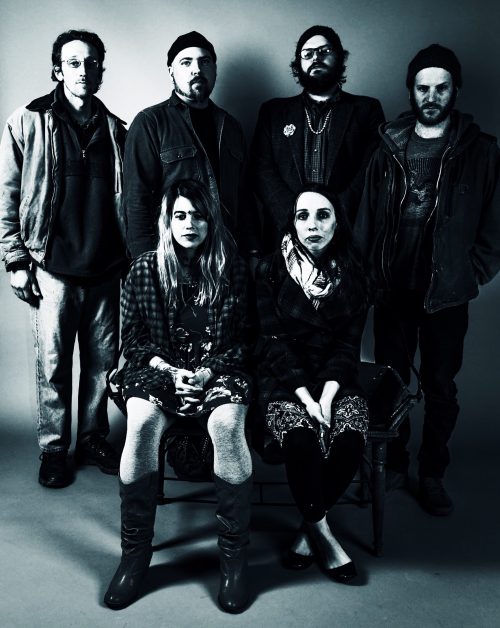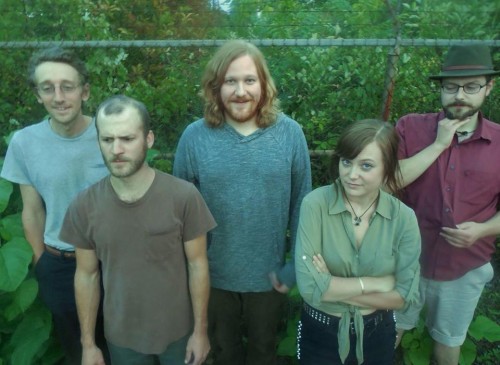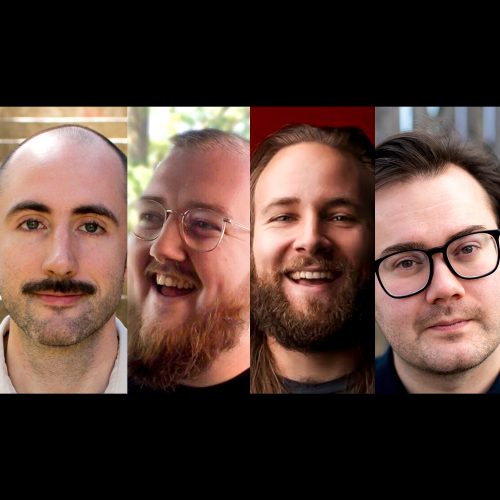Doghouse Charlie has been the solo nom de plume for Charles Davis, a driving force behind currently dormant psychedelic/dream pop/folk band Cherokee Red, for nearly a decade. But it has since coalesced into a collective boasting, at times, up to seven members, with musicians from both Cherokee Red and another Davis project, The Buck Knife, helping Davis bring his sonic dreams to life — “half a solo project” now, as he calls it.
On May 26, Doghouse Charlie will release a debut album, “Three Sisters,” and on Saturday, May 27, the group will play an album-release show at The Other Side in Wilkes-Barre, along with Mind Choir and Rosary Guild.
Below, you can stream the premiere of album track “Ok, Alright,” a song that sounds at once accessible and elusive, with Eastern melodies soaring over insistent rhythms and vocals that seem to invite you before shifting just out of reach.
“Three Sisters” finds Davis joined by the static Doghouse Charlie lineup of Allison Larussa, Andrew Sgarlat, Chelsea Collins, Matt Rattigan and Todd Kopec (of Cabinet), as well as guests Chelsea Smarr, Salena Diaz, Mark Wohl and Brittany Thomas.
In advance of the album release, we spoke with Davis, based in Wilkes-Barre, about the development of Doghouse Charlie, how it differs from Cherokee Red and the unique influences that found their way onto the record.
Tell us about the writing and recording process of the new album.
Some of these songs are kind of old. Some of the songs were supposed to be Cherokee Red songs, actually, in some capacity. Like a couple of them Brittany Thomas wrote with me, who’s in Cherokee Red; one of the songs is my bandmate Matt Rattigan’s from Cherokee Red; and Andrew Sgarlat, who also played in Cherokee Red, wrote some of the tunes. We initially sketched out some ideas for that band, which took an indefinite hiatus. I just kind of wanted to get going recording the music while some of the momentum was there. Brittany sings on the record, so it’s sort of a step we wanted to keep moving in, so we just stepped to the left, if that makes sense.
I think we started recording in, I want to say October or November of 2015. We’ve been recording with Mark Wohl, he’s fantastic. He has a studio in the Downtown Arts building in Wilkes-Barre. He calls his studio Wide Eyed Studios. I’ve recorded with different people at this point, and I really loved Mark’s recording. I guess that’s been a part of this process that’s been really simple.
For listeners familiar with Cherokee Red, how would you compare Doghouse Charlie’s sound?
Obviously, there’s no Dirk (Dekker). Dirk is a fantastic guitarist; he’s kind of sculptor, I would say. He’s not on this. He’s just been busy. We tried to get him to be on it. So it’s a little bit more aggressive, I would say. I think anytime I’m taking the lead vocal, I don’t have that sort of, ya know, beauty to my voice that was coming in Cherokee Red, so naturally it’s going to pull the arrangements a bit more into, I don’t want to say chaotic, but maybe dissonant, makes the arrangements a bit more aggressive perhaps. There’s a little bit more tension, as opposed to Cherokee Red, which could be soothing, relaxing. There’s an uneasiness about it, probably because of I sort of have a strange way of singing. Some people like it, some people don’t, that’s all I can say about it. With Christiana (Bartolini of Cherokee Red) or Brittany, you could say it sounded wonderful. You hear me sing, and it’s like, hmm, I’m going to have to think about this.
Were there any sort of touchstone albums you listened to while writing or recording “Three Sisters” that influenced the music, either intentionally or unintentionally?
I definitely wasn’t trying to imitate, but there were a couple of things I was listening to a lot. There’s an artist from Nigeria named William Onyeabor, he started in the ’70s, a sort of interesting period of West African funk music music that kind of popped up. …
And I listened to a lot of The Beach Boys the past couple years. My daughters have gotten into The Beach Boys, and I got deeper into them and went and revisited all the “Pet Sounds” and “Smile” and all that and sort of found myself deeper into them. I listen to a lot of jazz, too. A lot of John Coltrane, he’s sort of my favorite. A lot of Sun Ra and things of that nature.
When I was recording I was also listening to a lot of Los Hijos del Sol. There’s this music called chicha that a sort of South American folk music but then again a lot of different cultures were heavily influenced by things that were happening in the United States. It’s interesting psychedelic, I guess you want to call it rock, but it’s sort of jazz, sort of rock. They’re a 12-piece band from Peru; I found them on a compilation called “The Roots Of Chicha.”
We’ve talked about the Doghouse Charlie album, but how would you describe the live show?
Live shows are pretty heavy. We’re not necessarily a really loud band; we don’t pull any huge, full stacks or anything like that to the show, but we have six people, and at least two people are singing, sometimes three or four, and it can be a lot. I think, too, because it’s not like a root-note fifth type of band, everybody is sort of playing their own part. It’s not like the bass is following the guitar, which is following the vocals. A lot of people have come up to me and said it’s very fat sounding.
Is there anything else you wanted to mention about the album?
The album is called “Three Sisters.” It’s sort of a name that was popping up all over the place for me. I have three daughters. And it’s a planting style, like a Native American planting style. I think the Iroquois coined the Three Sisters, but I think there’s all different versions, all the way to Central America. It’s basically co-planting. Maize, squash or pumpkin or something and a bean of some sort, and they all just sort of help one another, like the maize grows and the beans grow with the maize and the squash weeds everything out. So I wanted to mention that.




Leave a Reply